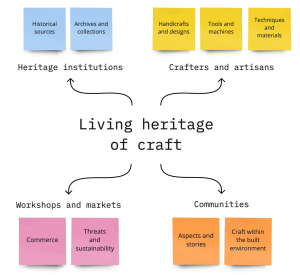The project “Linking collections with the living heritage of craft: enhancing communities through digital innovation” seeks to gather requirements and engage with heritage practitioners and international communities to develop novel technology mediated methods in order to contextualise crafted heritage collections. As a result, the project aims to transform and reinforce the links between tangible artefacts in memory institutions in the western world and the intangible living heritage practice in communities around the world. Such “transformations” have the potential to enhance the documentation of handicrafts collections, while nurturing the living heritage craft practices in developing countries in order to support communities to create sustainable futures. As demonstrated by international efforts, political, social, and economic inequalities can be substantially addressed when communities affected by them can be supported through initiatives that reinforce their sense of belonging and resilience through crafting and cultural practices.

As such, the project’s scope is to restore the links between:
- handicraft heritage collections that are based in the UK and the stories around them (who made them, where, how did they travel to the UK and so forth);
- the intangible knowledge of the act of crafting (how were they made, what materials have been used, which methods, designs etc);
- communities that still perform the craft today (or have developed it further) as a living heritage practice.
The project is being developed by Myrsini Samaroudi, International Research Fellow at the University of Brighton, in collaboration with an interdisciplinary group of academics. The research will involve gathering requirements from stakeholders, as well as developing a pilot that will explore how technologies enable us to link such information in order to “put handicrafts into context” and facilitate the “transmission of knowledge”. Hence, by exploiting the connections between collections, craft, places and people and the intangible knowledge that supports each one of them, the project has the potential to enhance the living heritage of craft and consequently strengthen craftsmen communities to build resilience. Moreover, the project is also expected to promote the development of cultural heritage collections through international collaborations which can enhance collective identities and have a wider societal benefit.
The project is funded by the Global Challenge Research Fund (GCRF) – International Fellow Scheme (IFS) 2019-20.